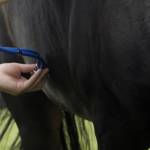Genetic Variation Influences Airway Obstruction in Horses

Researchers from the University of Guelph in Ontario, Canada, have found a genetic basis for recurrent airway obstruction (RAO) in horses.
The disease, which produces signs in horses that are somewhat similar to asthma in humans, is also known as heaves or chronic obstructive pulmonary disease (COPD). It is usually found in horses that are kept in stalls where they are surrounded by particles of dust and mold found in hay and bedding. Inhaling the particles causes inflammation in the horses’ airways.
Horses with RAO have three copies of a specific gene instead of the single copy normally found in mammals. This causes affected horses to produce much lower levels of an inflammation-reducing protein that is usually secreted in large amounts in the horse’s airway.
Multiple copies of this gene are found in horses, donkeys, and Przewalski’s horses but not in other mammals. The study analyzed the genetic pattern of 24 horses and found that one gene variant was about 2.5 times more prevalent than the second copy in most animals. In horses with RAO, that ratio significantly increased, suggesting abnormal regulation of the two copies. Two of the gene copies have characteristics that might be used in treating RAO. No function for the third copy has been found.
A synthetic version of the anti-inflammatory protein has been produced in the laboratory and is being tested. If the cure for ROA is as simple as introducing more of this protein into equine airways, this breakthrough might lead to the development of a similar treatment method for asthma in humans.








